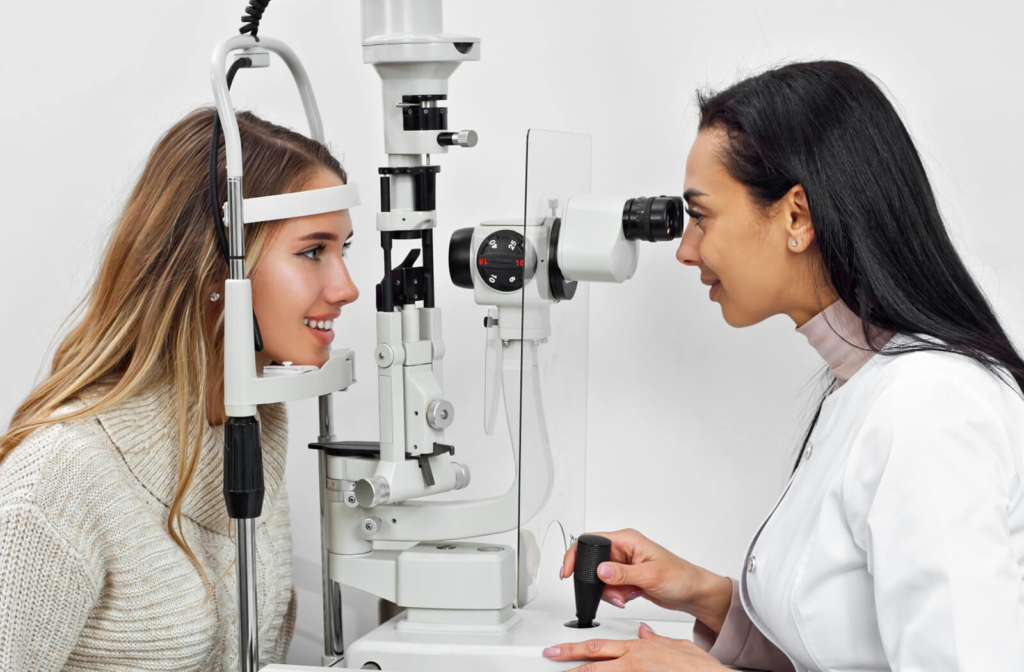If you’ve ever experienced eye floaters, you may wonder if your eye doctor can see them during an eye exam. The answer is yes, they can. During your appointment, your eye doctor can observe the floaters in your eye and check the health of your retina.
Floaters are usually not a cause for concern. They can appear in varying sizes, shapes, and colors and can drift across your line of sight in different ways. However, if you notice new or increased numbers of these floaters, it can be cause for concern.
What Are Floaters?
Eye floaters are caused by cells moving inside the gel-like substance in your eyes, casting a shadow on the retina. These shadows can look like specks, spots, or cobwebs, making them an odd sensation to experience.
Floaters can sometimes indicate something more serious is happening in your eyes. Age-related changes in the eye often cause them, but other events like inflammation, bleeding, or retinal tears can also cause floaters.
Even though floaters are typically not a problem, the importance of regularly monitoring them cannot be overemphasized. Too many floaters or a sudden onset of new ones may indicate a retinal detachment or a serious medical emergency.
How an Eye Doctor Can See Floaters
When you visit an eye doctor, they will conduct a comprehensive eye exam that includes a dilated eye exam, which allows them to see the floaters in your eyes. During this exam, the doctor will put drops in your eyes to dilate your pupils, enabling them to observe the inside of your eyes more closely and check the condition of your retina, including the vitreous humor, the gel-like substance in your eye that contains the floaters.
The doctor will then use a special instrument called an ophthalmoscope to see the retina at the back of your eye. With this tool, they will look for any signs of damage or debris in the vitreous humor. If there is something abnormal, such as bleeding or inflammation, it may cause more floaters to appear.
It’s important to note that seeing floaters is not always a cause for concern. Many people experience floaters at some point in their lives and often go away alone. However, if you notice an increase in the number of floaters or if you experience other symptoms, such as flashes of light or vision loss, it’s important to seek medical attention as soon as possible.
In some cases, more serious conditions, such as retinal detachment, can cause floaters. These conditions require prompt treatment to prevent permanent vision loss. That’s why it’s important to have regular eye exams, especially as you get older or if you have any underlying health conditions that may affect your eyes.
When Should You Get Your Eyes Checked?
It’s always important to take note of your eyes and the changes that happen in your vision. If you experience sudden changes in your floaters or vision, you should see your doctor right away.
Additionally, comprehensive eye exams should be a part of your regular healthcare regimen. They help detect eye problems early and can help maintain your overall health. Older adults and those with a family history of eye diseases need to take part in regular eye exams.
While vision changes occur as we age, not all age-related vision changes are normal. Some could be the early signs of eye disease. Once you reach the age of 40, you should start scheduling regular, comprehensive dilated eye exams.
Preventative Care & Eye Health Tips
Here are some preventative care tips to help you maintain good eye health:
- Schedule regular comprehensive eye exams with an optometrist. This simple routine can help detect early signs of eye disease.
- Follow a well-balanced, nutritious diet rich in antioxidants and vitamins.
- Wear sunglasses to protect your eyes from UV radiation. Exposure to the sun can cause diseases like cataracts or macular degeneration.
- Keep a healthy distance when using electronic devices. Ensure you are at least arm’s length from your computer screen to prevent eye strain.

Experience Quality Family Eye Care at Dr. Henslick Vision Center
At Dr. Henslick Vision Center, we care about treating your eyes and giving you the tools to help maintain optimal eye health, and understand the importance of proactive eye care for the whole family.Your family deserves proactive and passionate eye care.
Book an appointment today to experience genuine care for your family’s overall eye health.



